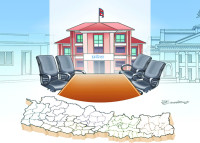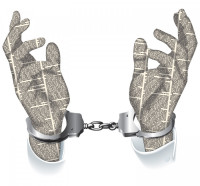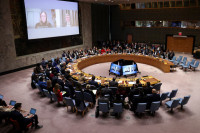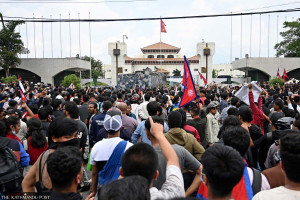Opinion
Tracing the missing
I appeal the govt to immediately make the whereabouts of those disappeared during the conflict public
Every August 30, since the signing of the Comprehensive Peace Accord (CPA) in 2006, families of the disappeared in Nepal have marked the International Day of the Disappeared to commemorate the memory of their more than 1,400 disappeared relatives. Yet, there has been little progress in addressing the demands of the families of the disappeared since the end of the conflict, eight years ago. Families of the disappeared continue to struggle for justice. There is a real threat that the April Earthquake and its subsequent aftershocks have irrevocably changed the political climate in Nepal and significantly reduced the political will to deal with the horrific history surrounding the disappeared in a meaningful way. “Let’s look forward, not back,” is a common retort on the issue by both those in power and politics. But the families of the disappeared cannot help but look back—they cannot and will never forget. The families remember, the community remembers, the country remembers and the memory of the disappeared lives on.
Search for my father
Fourteen years after the disappearance of my father, I continue to look for him while representing thousands of surviving families that are still waiting for answers about the fate of their disappeared relatives. After the security forces detained my father, beat him up publicly and tortured him, he eventually disappeared from their camp. After that my father was never seen again. It was a crime drama gone horrible wrong—one where the roles of the gangsters and the police were played by the same actors. In 2003 and 2004, after the Royal Nepal Army was mobilised in the war, hundreds of people were forcibly disappeared in Nepal. Like my father, many innocent people went missing. In many cases, the crimes were perpetrated by individuals known to the families and their relatives; these perpetrators are still in power and serve in the higher ranks of the security forces. In its 14th anniversary report, the National Human Rights Commission (NHRC) has named the alleged perpetrators in an effort to investigate and take action against the crimes, including the perpetrators of my father’s disappearance—then Chief District Officer Shiva Nepal; then Deputy Superintendent of Police Pitamber Adhikari, who is a senior official in Kathmandu these days, including other dozen of police officers; then Army Major Santosh Singh Thakuri, and many senior officers of Nepal army including Raju Basnet, Ajit Thapa, Ramesh Swar including former Chief of Army Staff Pyarjung Thapa and former head of Nepal police Kuber Singh Rana. Hundreds of alleged perpetrators have been named and recommended for punishment according to the current criminal justice system, but the government has done nothing. In my father’s case, on November, 2014, the UN Human Rights Committee (UNHRC) also asked that the Government of Nepal investigate and provide justice to us, the family members. Yet, the government has neither responded to the request nor approached us.
After all this time, the problem is not that my father was never seen again; the problem is that the those responsible refuse to speak about the crimes they committed and that the Government of Nepal is unwilling to enforce the 2007 Supreme Court ruling which classified all disappearances as criminal acts. The fact that the military, police and political parties remain staffed and lead by known perpetrators implies a lack of political will to take meaningful action on the issue of disappearance. Without criminalising enforced disappearances, the superficial commissions formed by the political parties cannot thoroughly investigate and satisfy the demands of hundreds of families for truth and justice and sustainable peace will remain elusive.
What happened to my father is not unique, but the sequence of events that have followed since reveals the total disregard for families of the disappeared. Instead of taking action against the alleged perpetrators, the government continues to protect them. Influential politicians and security personnel at the top seem to have both agreed not to criminalise enforced disappearances, thereby, weakening the two recently formed transitional justice commissions. In such context, the commissions cannot deliver the desired result, as per the flawed Commission on Investigation of Disappeared Persons, Truth and Reconciliation Act. Furthermore, it is crucial to recognise that only taking a legal approach to the issue cannot address the families’ social, economic, cultural and psychosocial needs. Their historical memory
must be recorded. Disappearance must be considered as a social agenda, as every family member is a part of society. As family members of the disappeared, we will never forget them until our last breath and the journey of justice continues.
Ratify the convention
The government has never officially recognised the crimes of forced disappearance or apologised to the affected families, nor did they implement the Supreme Court’s decision, NHRC recommendations, or the recommendations of the UNHRC or the UN Human Rights Office (OHCHR). It’s a shame for Nepal as a state and a member of the international community. Remembering all those disappeared and respecting their right to life and dignity, I appeal to the government of Nepal to immediately
make the whereabouts of those disappeared during the conflict public; to ratify International Convention for the Protection of All Persons from Enforced Disappearance, that affirms the right of any victim to know the truth about the circumstances of an enforced disappearance and the fate of the disappeared person, and the right to freedom to seek, receive and impart information to this end; and to criminalise enforced disappearance. I also appeal to the human rights community, international partners and the UN to pressure the Government of Nepal to recognise the right of any person not to be subjected to enforced disappearances, the right of victims to truth, justice and to reparation.
Bhandari is General Secretary of the Conflict Victims Common Platform




 5.83°C Kathmandu
5.83°C Kathmandu











